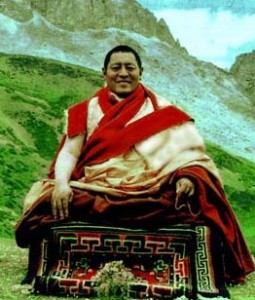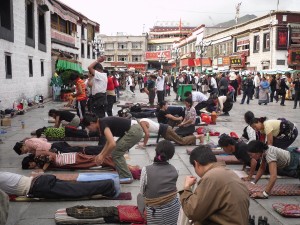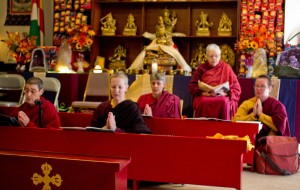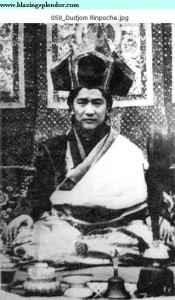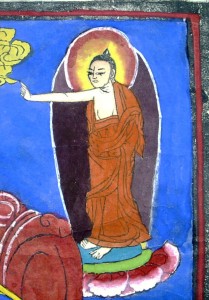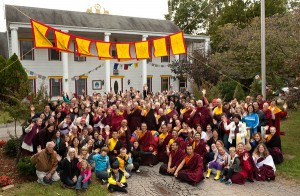[Adapted from an oral commentary given by His Holiness Penor Rinpoche in conjunction with a ceremony wherein he bestowed the bodhisattva vow upon a gathering of disciples at Namdroling in Bozeman, Montana, November 1999. —Ed.]
As the ancient literature states, there are five vows that pertain to rulers or kings, and those vows concern the ways a ruler, or really anyone in a position of authority, exercises power. Rulers who take the vow to train in bodhisattva conduct take the five special vows to ensure that they will not misuse power. The first of the root downfalls [associated with kings or rulers] is to embezzle or steal the wealth of the Three Jewels of refuge for personal gain. The second root downfall is to not allow others to practice or study the dharma. The third is to take the possessions of the ordained. The fourth is to cause harm to dharma practitioners in general. The fifth root downfall is to engage in any of the heinous nonvirtues, such as killing one’s own father or mother, killing a buddha, shedding the blood of a bodhisattva or an arhat (or engaging anyone else to perform this deed on one’s own behalf), or with deceitful intentions trying to influence others to engage in nonvirtue through body, speech, or mind. Those are the five root downfalls that pertain to kings or rulers. There are also five vows that pertain to ministers. The first four are the same as those for rulers, and the fifth concerns destroying villages or towns and harming lay people.
For beginners, there are usually eight root downfalls. The first of those root downfalls is to teach the dharma to people without being aware of the level of their spiritual development or capacity to receive teachings. For instance, if one teaches about the nature of emptiness to individuals who do not have the capacity to understand that level of teaching, those individuals may misinterpret and develop an incorrect view. Because [teaching in] that [context] is inappropriate, it is [considered] a root downfall. The second root downfall is to discourage someone from entering the path of bodhisattva training. The third is to disparage the path of the lesser vehicle of Hinayana and the followers who are the hearers and solitary realizers. That would involve, for example, saying to someone, “Your tradition is not really the true lineage of the Buddha.” The fourth is to claim that the Hinayana path is inadequate—for example, to make statements such as, “The dharma practice of the hearers and solitary realizers will not eliminate the passions.” The fifth is to put down others through slander or to speak ill of others out of jealousy in order to build up or boast about oneself. The sixth is to claim to have realization about the nature of emptiness when that is not true; that would be to speak an unsurpassed lie. The seventh is to embezzle or [otherwise] take the wealth of the upholders of virtue (those who dedicate their lives to the path of virtue). The eighth is to steal the wealth or possessions of ordained sangha (renunciants) and give that to ordinary, worldly individuals.
All those [eight root] downfalls pertain to beginners. As a beginner, if you commit any of those root downfalls, you will fall to the lower realms.
From a common point of view, a downfall involves giving up aspirational bodhicitta and abandoning the intent to work for the welfare of others because of being motivated by personal concern.
The first branch downfall is to act in a nonvirtuous manner [to be] crude and disrespectful, with wild and erratic behavior, which is exactly the opposite of how a bodhisattva should behave: a bodhisattva should always be peaceful and subdued. The second downfall is to be impolite, to behave inappropriately in the presence of others. As a practitioner in training, you must be concerned about others, which means that your conduct should reflect your mental training: your conduct, speech, demeanor, and so forth should always be in harmony with love and compassion. Those who have not rejected and have not even considered eliminating their attachment and aversion are always engaged in endless conversation and gossip based on attachment and aversion. If you are cultivating bodhicitta, you should not be like that. Instead, you should always think about love and compassion for all beings and speak in a way that reflects your training.
If you commit a root downfall, you must confess it immediately. If you postpone [your] confession of a downfall, that downfall will become more and more difficult to purify. Apply the four powers, and in the presence of the Three Jewels of refuge, confess your downfall. Pray to purify any negativity accumulated through the downfall, and then perform purification practices.
From “THE PATH of the Bodhisattva: A Collection of the Thirty-Seven Practices of a Bodhisattva and Related Prayers” with a commentary by Kyabje Pema Norbu Rinpoche on the Prayer for Excellent Conduct
Compiled under the direction of Venerable Gyatrul Rinpoche Vimala Publishing 2008

